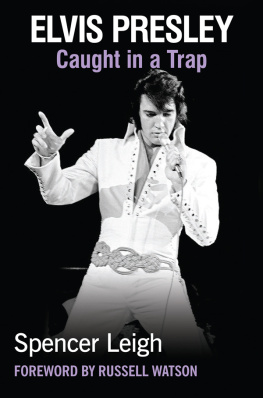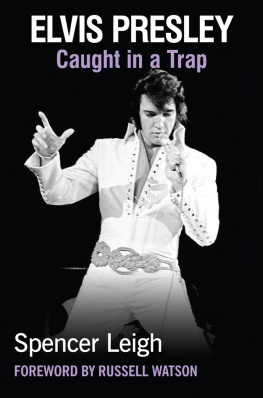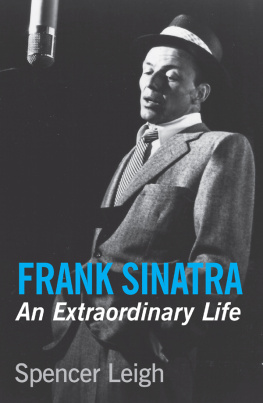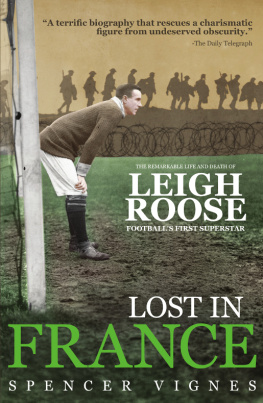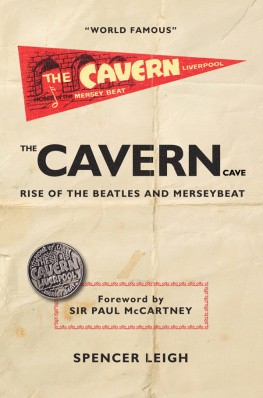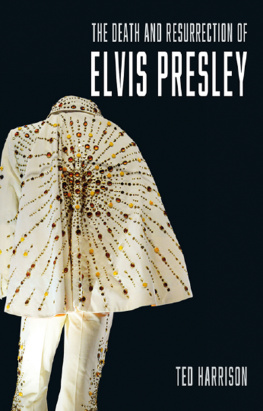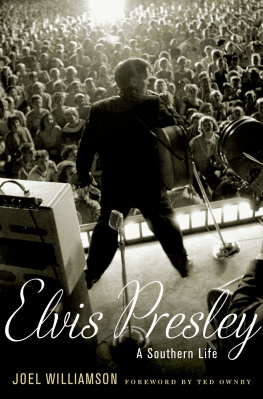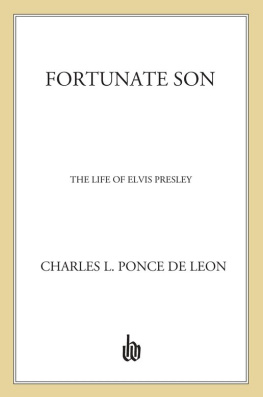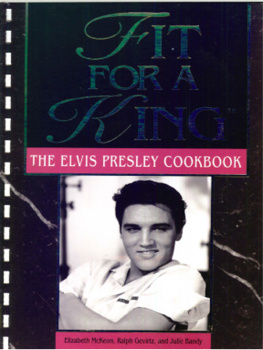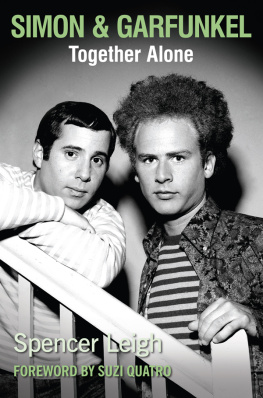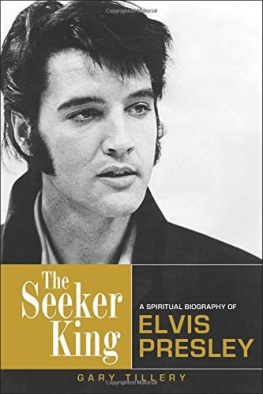About the author
Spencer Leigh was born in Liverpool in 1945 and still lives there. He is an acknowledged expert on popular music, both as a broadcaster and journalist. His On The Beat programme has been on BBC Radio Merseyside over 30 years and he is regularly featured in Record Collector, Now Dig This and Country Music People. His many books include Best of the Beatles: The Sacking of Pete Best, The Cavern Club, Love Me Do to Love Me Dont: The Beatles on Record, Frank Sinatra: An Extraordinary Story and Simon and Garfunkel: Together Alone, all for McNidder & Grace. He is an Honoured Friend at Sir Paul McCartneys Liverpool Institute of Performing Arts (LIPA) and he has a Gold Badge of Merit from the British Academy of Composers and Songwriters. Spencer continues to live with his wife Anne on Merseyside.
Contents
Foreword
by Russell Watson
Im delighted to have been invited to write the Foreword to Spencer Leighs brand new biography of Elvis Presley. He hoped I could add something about Presleys vocal range and technical ability. I feel privileged to be a part of this book, as I know Spencer writes with honesty and integrity and a genuine love for his subjects.
Presley had one of the great pop voices of all time, along with the likes of Roy Orbison and Nat King Cole, whose voices were completely distinctive. Whereas Orbison had an incredible range, which spanned over three octaves (including his falsetto) Elvis wasnt that far behind him. However, he hardly ever used the falsetto area of his voice. Presleys was a more raspy, throaty, rock sound and he was one of the pioneers of this style.
In the early stages of his career when the vocal folds were obviously younger and had much more elasticity, his vocal range was considerably more expansive; it sounded effortless, with hardly any vibrato. In later recordings, where his range had lessened, the sound was more mature and the vibrato more obvious. It was still just as distinctive though (probably more so). You can clearly hear this if you take the early recording of Hound Dog and compare it to say, The Wonder of You. The difference in the vocal tone, its quality and the vibrato generated are poles apart. It was less rocknroll, more chest than head voice, nowhere near as raspy. Dare I say it, more classical in approach.
I was interested to read recently that Elvis loved Dean Martin. Dean also had an incredibly distinctive voice and we all know and remember how he sang the phrase, Thats Amore. You can hear Elvis applying a similar style in some of his songs. Might I add, emulation being the highest form of flattery...
The author mentioned that some critics had said Elvis was out of tune on some of his songs, namely Love Me Tender and The Girl of My Best Friend. He asked for my opinion on this. Okay, if you listen to Love Me Tender properly, you will find that it is the guitar that is out of tune, not Elvis! Listen to the first few chords and it sounds like the bottom three strings are out of tune. Elvis is in tune! Yes, there are a couple of flat notes in The Girl of My Best Friend but it doesnt matter, as the imperfections in a human voice are what makes it so beautiful. To analyse notation to this level demonstrates a lack of connection with the music in any instance.
These days everything is perfect and you can use highly sophisticated computer technology to manually tune the voice, but to me the voice loses its natural beauty and soul if too much of this trickery is applied. Its the imperfections that make a voice unique and special. Take Nat King Cole as a perfect example. In many of his photos, Nat can be seen with a cigarette in his hand. Im not an advocate of singing and smoking but Im sure that beautiful, raspy, warm-sounding voice had come about through his smoking and the imperfections that created. It made him unique and instantly recognisable, still to this day and just like Mr Elvis Presley.
If you had just landed on this planet and had no idea who Elvis Presley was, you might listen to a song and say, Thats good, but if you walked into an arena and watched him perform, it would be a different beast altogether. Part of his appeal was his incredible stage presence. If you want to know what the X Factor really is, watch Elvis Presley in the 1968 TV special. Nobody else has what he had in that moment in time. Truly a voice for all generations!

Russell Watson
May 2017

INTRODUCTION
Stranger than Fiction
There are three requirements for a happy life. The first is having someone to love, the second is having something to look forward to, and the third is having something to do.
Elvis Presley to hairdresser Patti Parry
On Tuesday 16 August 1977, and shortly before his next round of concert dates, Elvis Presley collapsed and died in the bathroom of his home in Memphis. He was 42 years old. The media went into overdrive. On the news, there were pictures of fans weeping and late-night vigils. There were special supplements in the newspapers and experts analysed his career the good and the bad, but never the ugly. Once again, Elvis Presley was the biggest-selling record artist on the planet.
Twenty years later, on Sunday 31 August 1997, 36-year-old Princess Diana died in a late-night car chase in Paris, while trying to shake off the ever-present paparazzi. Again, there was blanket coverage on the news, even greater than Presleys, because the news infrastructures had advanced significantly; there were so many implications for the Royal Family and there was so much mystery about it. Like Presley, Diana could be a divisive figure but overwhelmingly, she was greatly loved.
I would never cry for someone I didnt know personally but I can understand the grief, even hysteria, although I wondered why was there so much of it. I am convinced that it all stems from Elvis. The Brits are famously reserved and at the time, the coverage of his death from America was thought flashy and over the top, but such displays have now become the norm so the dedicated admirers ensured that Diana had a greater display of public affection than Elvis.
The death of Elvis has become the standard for subsequent deaths of much-loved international figures, be it John Lennon, Michael Jackson, Prince, David Bowie or George Michael. There had been nothing like it at the time but this has become the default position for major celebrities who pass away. It serves as a strong example of how our media-led society is changing. There might even be an exhibitionistic or competitive edge about it you know, My grief is greater than your grief.
Contrast this with the very dignified funeral procession for President John F. Kennedy in 1963 and the stiff upper lip approach for Sir Winston Churchill in 1965. If we are to look to the past for anything to match the reaction to Elvis Presleys funeral, it would be the sobbing fans after the death of the silent screen glamour boy Rudolph Valentino in 1926.
There are other special factors relating only to Elvis. The ETAs, the Elvis Tribute Acts, for starters. There are so many of them in pubs and clubs and even stadiums. Ive seen many of them and I would estimate that 80% go for the Vegas look, although the younger Presley was the one who changed the world. That tells you more about the

